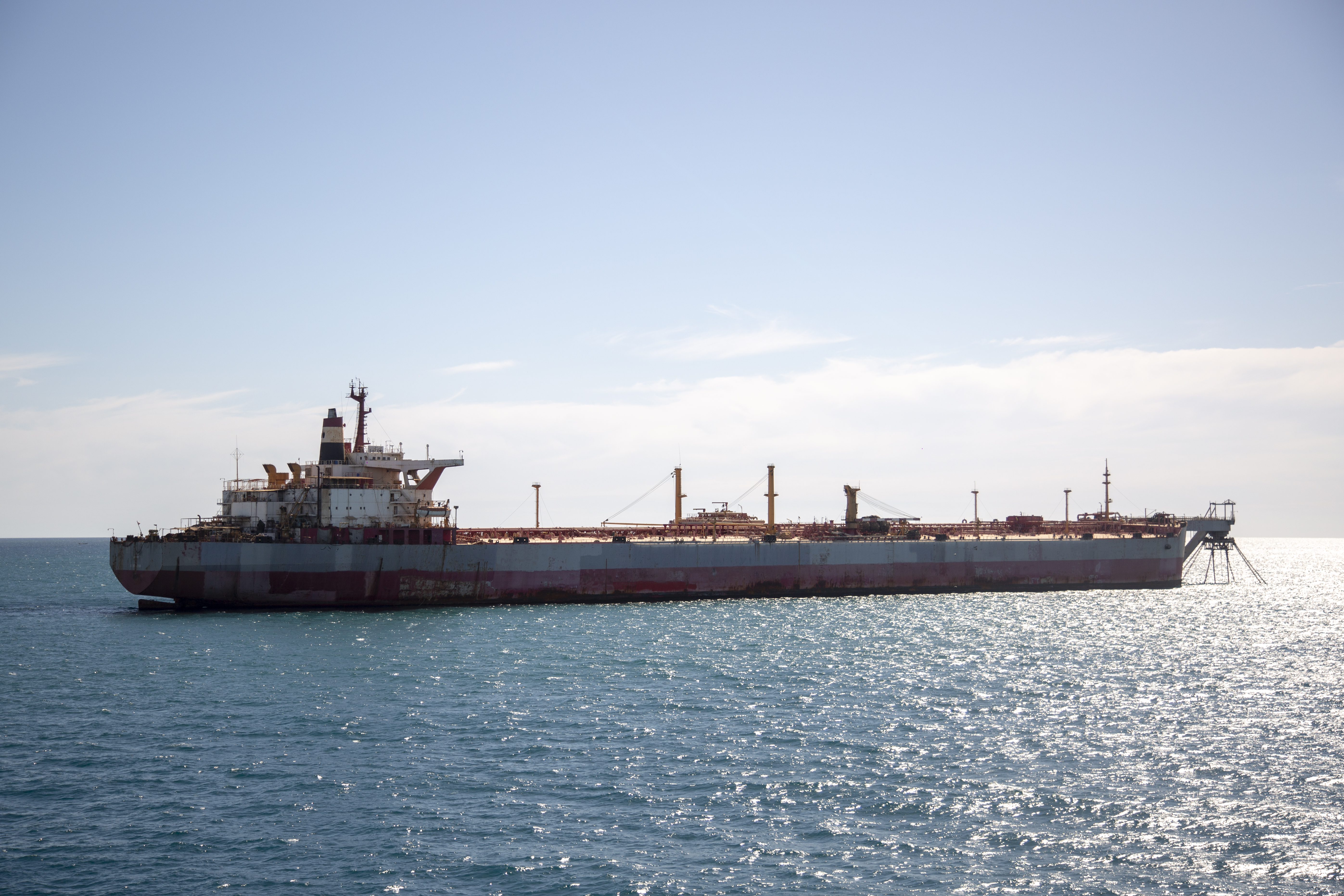Salvage vessel arrived today at site of decaying supertanker off Yemen’s Ras Issa peninsula to prepare for removal of more than 1 million barrels of oil. Funding still urgently required to complete the operation
UN Operation Underway to Prevent Catastrophic Oil Spill in Red Sea
May 30, 2023

FSO Safer supertanker as seen from the Ndeavor salvage vessel, May 30, 2023
Ras Issa, Yemen – The United Nations today started a challenging operation to remove more than 1 million barrels of oil from the FSO Safer – a decaying supertanker moored off Yemen’s Red Sea coast that threatens a humanitarian and environmental disaster.
In a critical step forward in the operation, the salvage support vessel Ndeavor, operated by lead marine salvage company SMIT, a subsidiary of Boskalis, and contracted by the UN Development Programme (UNDP) to undertake the transfer of the oil to a secure vessel, arrived onsite today.
The Ndeavor’s crew of experts will inspect the Safer and undertake all necessary work to make it secure for the transfer of oil to the replacement tanker Nautica, which is standing by in Djibouti to travel to the site next month and receive the oil.
The start of the operation on the water comes after almost two years of political groundwork, fundraising and project development, led by UN Resident and Humanitarian Coordinator for Yemen, David Gressly, who was aboard the Ndeavor today.
In December 2021, United Nations senior management endorsed the plan to prevent a spill by transferring the oil to a safe vessel and install long-term replacement capacity for the Safer, and asked UNDP to implement it, contingent on funding. Drawing on expertise from the UN System as well as external contractors, partners and experts, the UN has worked round the clock to prepare for this unprecedented effort.
“Today marks a critical step in the operation to remove the threat posed by the FSO Safer,” said UN Development Programme Administrator Achim Steiner. “With the marine salvage support vessel Ndeavor onsite, the project can now begin in earnest. This marks the culmination of tremendous amounts of work and coordination among UN agencies, maritime lawyers, oil spill experts and many more. This is a proud moment for the United Nations and for the UN Development Programme as the implementing partner for the emergency phase of the project to remove the oil. It is also a clear sign of what multilateral cooperation can achieve, and a prime example of the importance of prevention. Aside from a possible humanitarian and environmental catastrophe, funds spent now will prevent as disaster that could cost billions in the future. With this in mind, we call again upon the international community and private sector to step up and support us to close the funding gap on the project so that we can finish what we have started.”
Even after the oil transfer averts the worst-case scenario of a spill of 1 million barrels, the decaying Safer will still hold a considerable amount of residual oil and pose a significant environmental threat to the Red Sea.
But the project remains underfunded, with $29 million still needed, including to safely moor the replacement vessel to a catenary anchor leg mooring buoy and towing the Safer to a green recycling yard.
“Member states, private companies and the general public have contributed $114 million to stop the Red Sea Spill, and so many other partners that have contributed expertise and advocated for this critical operation. I thank them all and want to recognize SMIT Salvage and the Fahem Group for presenting an initiative in 2021 that became the basis of the project being implemented today,” said David Gressly. “This is a great milestone, but we will not rest easy until the operation is completed. To do that we are counting on generous donors to close the remaining $29 million budget gap.”
***
Note to editors:
Photos, videos and infographics are available here.
For the UN Development Programme, contact: dylan.lowthian@undp.org +1 646 673 6350
For the UN Resident and Humanitarian Coordinator for Yemen, contact: geekie@un.org, Sana’a +967 71 222 1850; New York +1 347 654 0913
***
Background
The FSO Safer has been moored about nine kilometers off Yemen’s Ras Isa peninsula since 1988 and could explode or break up at any time. Due to the conflict in Yemen, the FSO Safer has decayed to the point where there is an imminent risk it could explode or break apart, which would have disastrous effects on the region and beyond.
A major spill would devastate fishing communities on Yemen’s Red Sea coast, likely wiping out 200,000 livelihoods instantly. Whole communities would be exposed to life-threatening toxins. Highly polluted air would affect millions. It could close off the ports of Hodeidah and Saleef – which are essential to bring food, fuel and life-saving supplies into Yemen, where 17 million people need food assistance. The closure of desalination plants would cut off a water source for millions of people. Oil from the Safer could reach the African coast and affect any country on the Red Sea. The environmental impact on coral reefs life-supporting mangroves and other marine life would be severe. Fish stocks would take 25 years to recover.
The cost of cleanup alone is estimated at $20 billion. Disruptions to shipping through the Bab al-Mandab strait to the Suez Canal could cost billions more in global trade losses every day, as happened after the Ever Given grounded in the Canal in 2021.
The UN Resident and Humanitarian Coordinator for Yemen, David Gressly, has led UN system-wide efforts since September 2021. UNDP is implementing this complex and high-risk project.

 Locations
Locations

